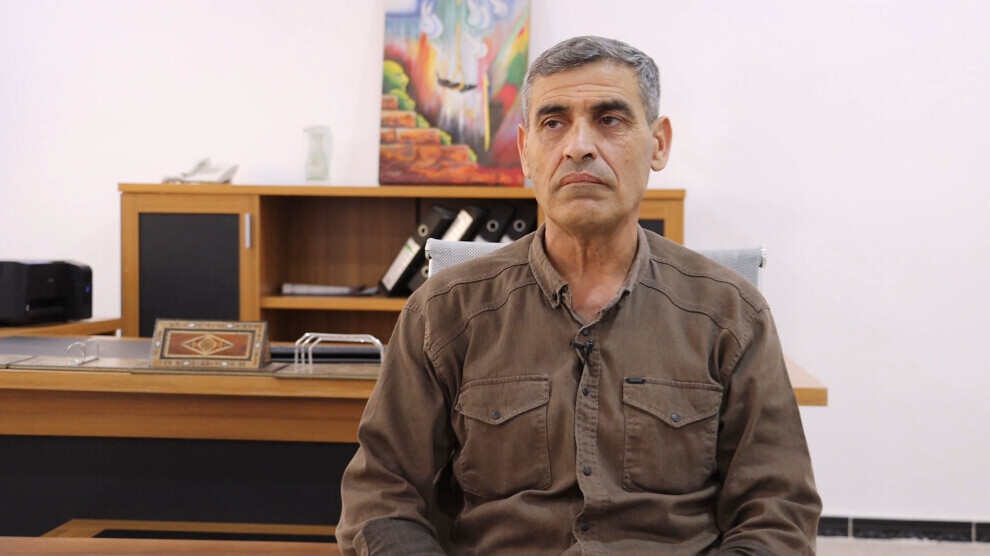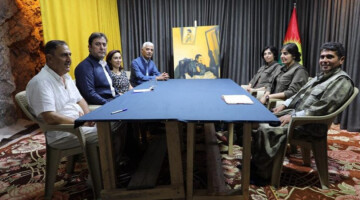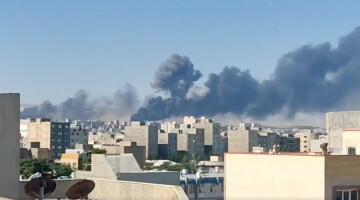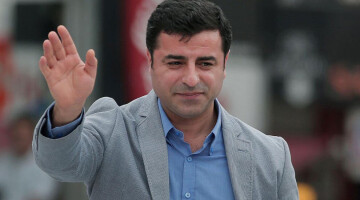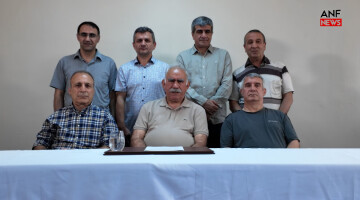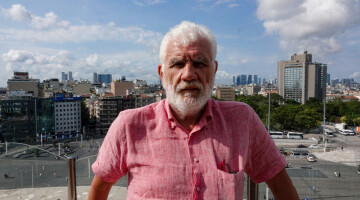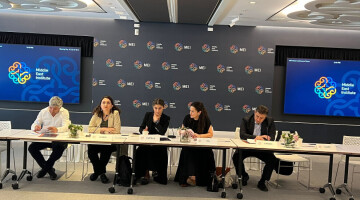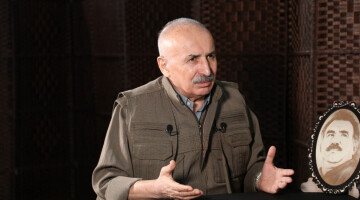Hesen Koçer, Deputy Co-Chair of the Executive Council of the Democratic Autonomous Administration of North and East Syria (DAANES), told ANF that the aim of the Turkish state is to make a demographic change in the region and to create contradictions between the peoples of the region.
Evaluating the interest policies of the Turkish state and regional states towards refugees, Hesen Koçer said; “The reason why some states such as the Turkish state have kept Syrian refugees on the agenda since 2023 is not because they have an approach that will benefit these refugees or based on their interests. The main purpose of these countries is the politics of interest they pursue through refugees. These interests are mostly based on how much economic benefit they can provide. In particular, the policy of the Turkish state on refugees has been much dirtier.
‘The Turkish state used refugees to achieve its policy in the Middle East’
The Turkish state has not only turned them into political material. It also used those refugees as an armed force within gang groups. In this way, it utilised them to achieve the policy it wanted to carry out in the Middle East and on the states of the region, and especially to achieve the goals it had set for itself in the region. This was one side of its policy. On the other hand, it has always used these refugees as a threat against Europe. It continues this policy until today. Today, it is creating a demographic change in the region by settling these refugees in the regions it occupies.
By settling people from different parts of Syria not in their own regions, but in the regions it occupies, especially in North and East Syria, it will both make a demographic change and ensure the emergence of serious contradictions among the Syrian peoples. This is the main goal of the Turkish state. Within the framework of this goal, the Turkish state is settling many people in the occupied regions and building new villages and camps in these regions. It is doing this through some organisations affiliated with Qatar and Kuwait.
Under the guise of humanitarian organisations, these institutions are actually taking part in the demographic change in the region. The Turkish state's racist attacks in Turkey until a year ago, which led to the deaths of many people, the looting of Syrian refugees’ shops; all these are planned as a result of a conscious and special policy against refugees.”
‘Peoples suffer the consequences of the wars created by international states in the region’
Hesen Koçer said that the wars in the region also created a wave of migration and continued: “There is a very serious war in the region. This war is not only a physical war waged by states against each other; it is also being waged on the basis of political, social and cultural genocide against societies and peoples. Of course, this war is also affecting refugees in a very serious way. The Ukraine-Russia war, the Hamas-Israel war and the conflicts in general are all causing an increase in the number of refugees in the Middle East on the one hand, and on the other hand, paving the way for new migrations and causing a wave of migration towards Europe. While there are solutions and alternatives to the problems, the peoples who could fundamentally solve the real problems are being victimised by these wars. Today, the hunger, misery, forced migration from their own lands and the deep misery experienced by the peoples of the region under these conditions are the result of the wars created by international states in the region. While there is migration on the one hand, demographic change is taking place in many areas in the region due to these migrations on the other hand. Moreover, these migrations lead to an increase in unemployment, poverty and humanitarian tragedy.
There have been very violent attacks against North and East Syria. With these attacks, a policy of displacing the people from the region was implemented. However, the people of North and East Syria managed to resist these attacks. Today, if the refugees are turning to the North and East Syria region, it is thanks to the security and stability in this region. In addition, taking care of the problems of the refugees and meeting their needs makes people turn to North and East Syria.
There are many refugee camps in northern and eastern Syria. There are people from North and East Syria who were forced to flee their homes due to the occupation. They are staying in Serdem and Berxwedan camps in Shehba. Those coming from Serêkaniyê and Girê Sipî are staying in Serêkaniyê camp and Til Semin camps in Raqqa. The IDPs are staying in these camps with the aim of returning to their cities. This is the expectation of the people.
‘The Turkish state wants to drag society into chaos through threats and attacks’
Again, there are refugees coming from different parts of Syria other than North and East Syria. These refugees are also staying in camps in North and East Syria because it is a safer region. However, the Turkish state wants to drag society into chaos through threats and attacks. The war policy of the Turkish state in the region is, of course, having a negative impact on the situation of the refugees here.
For this reason, as the Autonomous Administration of North and East Syria, we have always said and are saying that ‘we will share every means we have with all Syrian peoples.’ No one can question the nationality of North and East Syria in this regard. In other words, some people’s arguments that the autonomous administration is promoting the fragmentation of Syria are baseless. We do not neglect to meet the needs and defend the rights of all the peoples living in North and East Syria. Again, whoever comes to this region, we will show the same approach to them.”
‘Attacks in the region cause an increase in migration’
Hesen Koçer pointed out that the Damascus government must do its part in order for the Syrian refugees who had to leave their homes and cities to return to their land and said: “As the Autonomous Administration of North and East Syria, we have always approached the refugee problem principally. We have always made our calls based on this principle and welcomed the Syrian refugees from Lebanon, too, on this basis. The Israeli attacks in Lebanon had serious negative effects on the Syrian refugees in Lebanon. Syrian refugees in the south of Lebanon in particular have faced great danger. We set up a crisis desk on this basis.
We set up committees in both northern and eastern Syria and Lebanon to help the refugees and ensure their passage. We prepared camps, and those who had homes here were helped to settle in their own homes or with relatives. Those who came from outside North and East Syria were sent to camps. About 20 thousand refugees have crossed so far and this number is increasing every day.
Of course, there are camps set up for the resettlement of these people and we have even appealed to many international humanitarian organisations for the needs of the refugees. Some humanitarian organisations have responded to our call, but the majority have not responded so far. The attacks in the region cause an increase in migration. As the Autonomous Administration, our approach is for everyone to return to their own lands.
‘The longer the war lasts, the more migration will increase’
On this basis, we have been calling on international powers and organisations to support the return of refugees to their homelands. So far, however, there has been no serious response to these calls. Some aid organisations in the region are providing assistance to the refugees, but of course, this is not enough to alleviate the hardships and sufferings of the refugees. These people have lost their lands and cities. In addition, the situation of refugees in war-torn areas is worsening. Previously, we have called for the return of refugees from North and East Syria to their own lands. Our call for Lebanese refugees is also on this basis. As the Autonomous Administration, our approach towards refugees is clear. Many states use refugees as political tools and this is the most dangerous approach.
Therefore, there is no solution to the refugee problem in the current situation. On the contrary, it seems that this situation will turn into a much more dangerous crisis in the future. This crisis will be experienced not only in the Middle East but also in European countries. Because the war is not over and the longer the war lasts, the more migration will increase. It seems that this war will continue. In this sense, the situation of refugees is not good. As the Autonomous Administration, we will continue to provide all the support and assistance we can for the refugees.
‘The Damascus government does not have a clear policy for the return of Syrian refugees’
This requires the support of international aid organisations. Likewise, the government in Damascus must fulfil its duty towards the Syrian people. However, so far it has not fulfilled this duty.
The economic, military and political situation of the Damascus government has a negative impact on the refugees. So far, the Damascus government does not have a clear policy for the return of Syrian refugees to their homeland.
Millions of people have migrated from Syria so far. In order for these people to be able to return, there must be a special policy. So far, however, it seems that everyone is approaching the refugee problem according to their own interests. Some are trying to benefit economically, others want to use it as a tool of social pressure, and the government in Damascus is part of this policy.”

